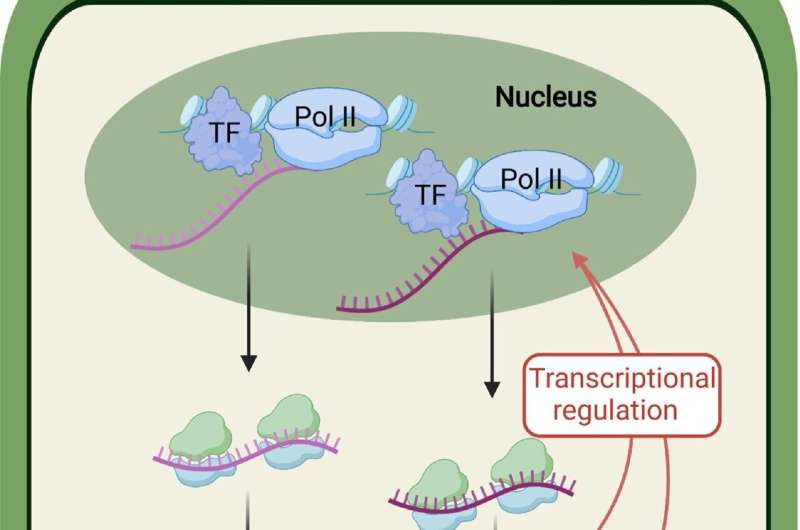This article has been reviewed according to Science X's editorial process and policies. Editors have highlighted the following attributes while ensuring the content's credibility:
fact-checked
peer-reviewed publication
trusted source
proofread
Plant metabolism proves more complicated than previously understood

Plants have evolved fiendishly complicated metabolic networks. For years, scientists focused on how plants make secondary metabolites, the compounds that plants produce to enhance their defense and survival mechanisms.
"Only recently have we started appreciating that the genes involved in making those specialized, secondary metabolites are being regulated," said Ying Li, associate professor of horticulture and landscape architecture at Purdue University. "They are turned on when plants need to make secondary metabolites. And they are turned off when plants will no longer need to make them."
Purdue's Natalia Dudareva, Distinguished Professor of Biochemistry and Horticulture and Landscape Architecture, said, "Also, secondary metabolites are often toxic to cells when they accumulate to high levels, as we saw when we manipulated the resistance of the barriers that volatile secondary metabolites have to pass through to be released into the atmosphere. However, cells sense the accumulation of these toxic compounds and downregulate genes responsible for the formation of precursors for these volatiles."
In a special issue of the journal, Trends in Plant Science, Li and Dudavera highlight the importance of specialized metabolites in regulating the genes that plant used to form chemical compounds. Dudareva directs, and Li is a member of Purdue's Center for Plant Biology, which aims to provide a clearer understanding of processes that affect plant biology.
"We saw initial hints that the secondary metabolites themselves can be the signal to say, 'OK, now we need to turn those genes on and off,'" Li said. "And we almost know nothing about how metabolites are sensed by the plants and then lead to the genes turning on and off."
Sorting out the complexities of secondary metabolism presents challenges because the process is highly specific to each different plant lineage. Sometimes, only specific cells make secondary metabolites at a particular time for a given plant type. The plants often produce metabolites in small quantities, making them difficult to detect.
Researchers also need to assay how the metabolites interact with proteins. "That allows you to say which protein can sense and bind to these metabolites," Li said. Gene regulation is also involved. "You have to be able to assay gene expression. And that is enabled by the next-generation sequencing toolkit."
Even though a specific plant makes its own unique metabolites, "next-gene sequencing in the last 20 years allows us to look at the genome activity of any plants," she said.
Like many plant scientists, Li focused much of her research on primary metabolism, especially nitrogen metabolism, which plants rely upon for growth. The level of specialization in secondary metabolism surprised her. Despite the differences between primary and secondary metabolism, they seem to follow similar rules at the molecular level, she said.
"Secondary metabolites are important for a plant to adapt to a stressful situation. For example, during drought or pathogen attack, secondary metabolites help to fight off those stresses," Li said. Secondary metabolism is also important for pollination success. Flowers attract insects, but climate change brings concerns about whether the pollinator-plant relationship can keep working.
"For these reasons, there is always a dream of being able to do metabolic engineering to make plants produce more of the specialized metabolites that are good for plant survival, better resistance to a stress condition, to make medicine, or attract pollinators better," she said.
Researchers need to better understand how producing too many metabolites can upset gene regulation. But if the process can be disrupted in the right place, "then we can safely produce a lot of metabolites because it doesn't trigger the feedback regulation," Li said.
More information: Ying Li et al, Enough is enough: feedback control of specialized metabolism, Trends in Plant Science (2023). DOI: 10.1016/j.tplants.2023.07.012
Journal information: Trends in Plant Science
Provided by Purdue University





















